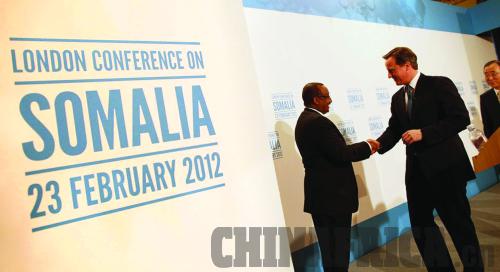| 
The point of confluence of opinion in the ongoing international efforts to pacify war-wracked Somalia is that the February London Somalia Conference was an event of great significance.
If nothing else, the sheer number of attendees, drawn from 50 nations, as well as supranational agencies led by the United Nations, was a very first in Somalia's sad two-decade statelessness. That Somalia climbed up the global agenda with renewed interest in the search for solutions for its long suffering people was in and of itself, laudable.
Questions linger as to whether the conference was a turning point in crafting a roadmap toward the desired goal of Somalia making a clean break with its two-decade-old state failure. Will, for instance, all Somalia combatants ranging from pirates to warlords and Jihadist fighters lay down arms and embrace peace on the basis of the resolutions of the London convention?
Reflections on the post-conference period are a mixed bag of both pessimism and optimism. One of the early drawbacks of the conference was the leaking of the final communiqué that went viral on the Internet well before the high-powered delegates could officially ink their final resolutions. The "leak" goes a long way to demonstrate the lengths to which vested interests will go in keeping tabs on unfolding scenarios in a nation that holds the dubious distinction of being the "most dangerous place in the world."
Indeed the impediment to durable peace in Somalia is the messy intricacy of vested interests operating above and below the surface. Some skeptics feel that the real motivation informing the new push for stability in Somalia is economic rather than altruistic factors. Various economic factors, such as the possibility of huge deposits of oil and natural gas, the lucrative maritime trade off the Somalia coast and the fishing industry have been pointed out as informing the need to steady the rocky Somalia ship.
The background to the conference was informed by the relative calm that was returning to Somalia as the rag tag al Shabaab militia suffered a three-pronged onslaught from the Africa Union Mission in Somalia and Kenyan and Ethiopian forces. To a great extent delegates seem to have been riding on the wave of these battlefield triumphs.
It has not been lost on Somalia watchers that London was pricked into action on the heels of Turkey ratcheting up contact and engagement with Somalia including the establishment of a diplomatic mission in Mogadishu. Similarly, Gulf States have been making inroads into a calming Somalia as has done China, which not only has a navy escorting cargo ships in the choppy Somalia waters but also holds oil prospecting concessions in the country.
However, as of mid March, al Shabaab seem to have rebounded, inflicting heavy losses on the Ethiopian forces and killing four Kenyan civilians in Nairobi. This is an indication that those who might have written off al Shabaab might have celebrated too soon.
Indications of a resurgent al Shabaab provide the first test to the commitments made at the conference. Will the international community follow through its resolution to provide more funding for the troops on the ground in line with a recent UN resolution for an increase in AU forces from about 13,000 to nearly 18,000?
From some schools of thought, it was a mistake to leave out al Shabaab representation to the conference given that the group is a major stakeholder in Somalia. While breakaway states of Puntland and Somaliland were represented, it was thought inviting al Shabaab to the roundtable would have been an endorsement of terrorism. Yet, in Afghanistan, Western powers have now appreciated the importance of engaging the Taliban, a group similar to al Shabaab in more than one respect.
A perusal of the resolutions of the conference shows that piracy was top on the agenda. It is now appreciated that to tame the menace, piracy must be tackled on land, not only at sea (via the navies escorting cargo ships). More interestingly however has been the revelation that long haulage maritime businesses might have been involved in a bid to stem rising insurance premiums resulting from counter-piracy costs. Was Cameron pushed to act on the basis of city of London corporate elites looking to cut costs of doing business through the Gulf of Aden, a major sea route linking Europe, Middle East and Africa?
Another huge lacuna in the deliberations and resolutions is that the whole issue of dumping of toxic waste by international syndicates into the Somalia waters was given a wide berth.
Probably the most problematic issue going forward is the new political architecture that should emerge at the expiry of the Transitional Federal Government's (TFG) mandate in August. While many are keen to see TFG leaving the stage, there is no clarity as yet on what political structure will be in place from August onward.
(The writer is a Kenyan journalist currently studying at the Communication University of China with an interest in Sino-African relations) |